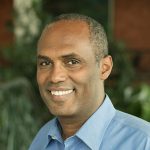Imagine a world where you would be judged by the power of your ideas and not by your title, your origin, your age, your sex or even your academic credentials. Imagine a world where ideas can be debated with great openness and where it is still possible to make decisions by consensus. Imagine a world where competitors work together for the future of humanity.
This world exists, at least for the Internet. It is the Internet Engineering Task Force (IETF) where thousands of people from around the world work on the next technical standards that will be used by the billions of Internet Users. For more than three decades the IETF developed the hundreds of standards that we need to use every time that we send an email, consult a website or use social media on the Internet.
To work in an IETF working group you don’t need any credential or permission; you just need to be willing to register to the mailing list, follow the issues and contribute on a volunteer basis. You don’t even have to participate to the face-to-face meetings that take place somewhere around the world three times a year. You can initiate, promote and get an Internet standard approved without leaving your home, as long as you have Internet.
I had the chance to participate in the latest face-to-face meeting that took place last week from April 3-8 2016 in Buenos Aires. I have always been fascinated by the IETF and I was excited to see it meeting in Latin America for the first time. I was hoping to learn from the Latin American region about what it did to bring such a legendary meeting to its land. I did learn a lot that I hope would help me work towards increasing Africans’ participation in the IETF. But what fascinated me most was the extraordinary and probably very unique collaboration model in the IETF.
It was interesting to see people from all origins, backgrounds, ages, sexes and skin colors meet and argue on specific draft standards that go through several iterations before a “rough” consensus is reached and the draft is considered as a standard or an RFC in IETF language. What is amazing is that there is free exchange of ideas, very often in a heated manner, but everybody accepts the criticisms and uses them to improve the draft document rather than to fight each other. As a result, high quality standards are developed for the world to use in a very short time and at little cost.
What is also unique to IETF is its culture of sharing. During my stay in Buenos Aires I asked dozens of IETF community members to meet me to discuss about my ideas for IETF in Africa. Every one of them not only responded to my request but also was extremely helpful even tough they met with me for the first time. This is strikingly different from other organizations where one has to spend weeks if not months to get an appointment to discuss about something that is central to the mission of that organization.
On my way back from Buenos Aires, I reflected and I dreamed. What if we could use this model to solve our problems, and not only in technology? Why can’t we emulate the IETF to solve our day-to-day problems in Africa? We live in an era where revolutions are the norm rather than the exception. So why not we revolutionize the way we debate, collaborate and come to an agreement to solve the many problems that we have in Africa?
This might be a long shot. But, I also had another dream which I am convinced is achievable in the short term. This dream is for Africans to participate to the IETF works at the same level as the rest of the world. Today, Africans’ participation in IETF is very limited. Because of that, Africa does not only have an Internet industry but is also jeopardizing its chances of having one in the near future. For the first time in history, Africa has the possibility to compete with the rest of the world on almost equal footing thanks to the Internet that is bridging the historical gaps between countries. But unless, we Africans use this opportunity by playing on the fields where the developed countries are playing at, we will miss this unique opportunity for the development of our countries.
If you share my dream, let’s work together to bring Africa to IETF. Contact me at [email protected].
